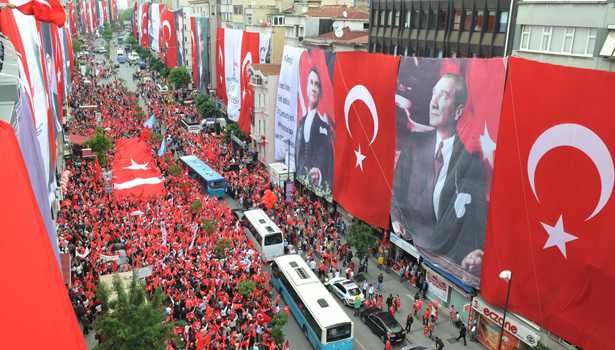By Emrullah Uslu
Friday, August 15, 2008
Two important political events have deeply influenced General Basbug’s political outlook. The first occurred from September 5 to 7, 1955, when a rumor that Ataturk’s home had been bombed in Greece led to violent demonstrations, which later tuned into a campaign against Turkish citizens of Greek and Armenian origin and their shops in Istanbul. After three days of chaos, one Turkish Armenian and 16 Turkish Greek citizens had been killed; and thousands of Turkish citizens of Greek origin, including Basbug’s neighbors in Kuzguncuk, were forced to flee from Turkey (Tempo, May 8).
The second event was the 1960 military coup. The events of 1960s left graduates of the Turkish Military Academy, including Basbug, unsympathetic toward military coups (Tempo, May 8). Perhaps because of the traumatic events of the 1960s, Basbug adopted a “survival-strategy” within the military bureaucracy, but this has by no means made him a naïve commander. He is very outspoken about the developments in northern Iraq and particularly the problem of Kirkuk. In June 2004 Basbug told reporters that “political attempts to change the demographics of Kirkuk in favor of one ethnic group [Kurds] have been continuing.” Such attempts to alter Kirkuk’s demographics would endanger the unity of Iraq and create a serious security problem for Turkey (www.tsk.mil.tr, July 8, 2004). The following November, General Basbug stated, “If the Kurds control the oil fields, it would lead to a civil war in Iraq.” In his inaugural speech as Commander of the Land Forces on August 25, 2006, Basbug hardened his tone: “given the fact that some states [the United States] and groups [the Kurdish leadership in northern Iraq] do not take effective measures against the PKK terror before finding a solution for the Kirkuk problem, we should develop strategies to force them” to do so (www.tsk.mil.tr, August 25, 2006). Basbug thinks that the developments in northern Iraq, including the Kirkuk problem, are more dangerous for Turkey’s security than the PKK threat (Hurriyet, September 27, 2007).
Another issue that Basbug is passionate about is Cyprus. In 2007 he said, “I was a junior officer when the events of 1963-1964 and 1967 were taking place in Cyprus. I was a captain at the operation center in Ankara during the Turkish military’s Cyprus operation in 1974. We consider the Cyprus problem a national problem. Our goal is to maintain the development of the Turkish Republic of Northern Cyprus (TRNC), its sovereignty, and its peoples’ prosperity” (Sabah January 23, 2007). Political efforts have increased on both sides of the island to find a solution (www.bianet.org, May 13), but an eventual agreement might not be to Basbug’s liking.
Basbug is now in a firm position to maintain the durability of the nation-state. He thinks that “without maintaining the structure of nation-state, it is not possible to maintain the unity of the state (www.tsk.mil.tr. August 25, 2006). Like his predecessors, Basbug also believes that the Turkish nation-state has two challenges. The first is the Kurdish question. On this issue, Basbug, like the rest of the security establishment, is deeply committed to eradicating the PKK through any means possible, including harsh military repression (Sabah, October 5, 2007). Unlike many of his colleagues, however, he is realistic enough to acknowledge the social and economic aspects of the problem and engage in criticism toward former policies that “failed to prevent people from joining the PKK” (Sabah, October 5, 2007). Basbug is, however, by no means sympathetic to the idea of providing political rights to the Kurds (Milliyet, October 28, 2006).
Basbug’s thinks that the second challenge to the foundations of the nation-state is Islamic reactionarism, irtica. In an opening address at a ceremony of the Turkish Military Academy in 2006, Basbug made the irtica debate public, stating that there was a threat of irtica against the state. Since then, Basbug has been the foremost advocate of this view.
With regard to irtica, domestic developments are against Basbug’s position. An overwhelming majority of Turks are sympathetic toward moderate Islamic government and social networks and do not consider the networks a threat to the state. In that area, Basbug has no public support. Basbug, who has a Western orientation, recently found himself in a political environment led by neo-nationalist movements unsympathetic to the West. Under the influence of these movements, Basbug went so far as to suggest that Turkey needed a “local bourgeoisie” that subscribed to protecting and maintaining the Turkish revolution (Milliyet, December 1, 2006)
Political circumstances and international developments are not on Basbug’s side. If he insists on an isolationist political perspective and tries to use his power to replace the new middle class political figures with neo-nationalist politicians, he is likely to face political confrontation at best or political chaos at worst.


Leave a Reply